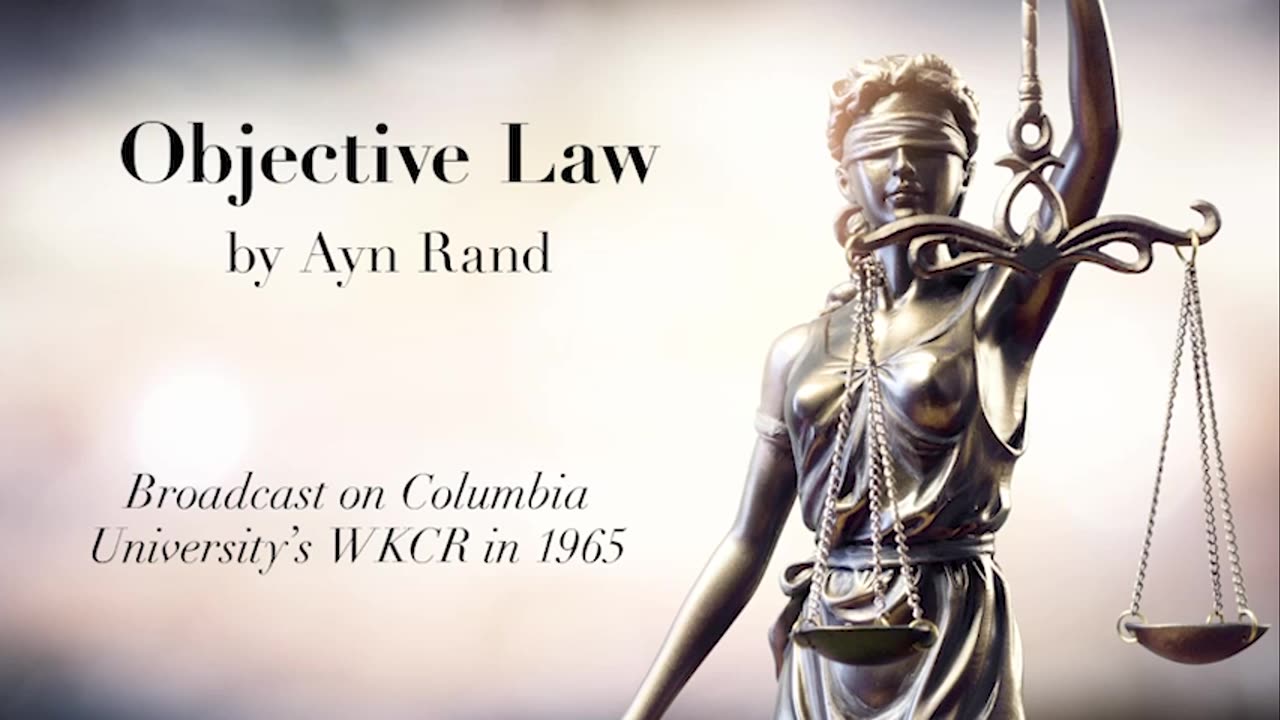Premium Only Content

'Objective Law' (1963) by Ayn Rand
This is a talk about Ayn Rand’s essay "Objective Law", included in her 1963 collection The Virtue of Selfishness, is a compact but powerful argument for a rational legal system grounded in individual rights and objective principles. It offers a moral and philosophical foundation for the rule of law, defending the idea that a proper legal system must be based on objective definitions and universal rules, rather than arbitrary power or subjective whim. The essay is both a critique of modern legal ambiguity and a call for a principled approach to governance.
Rand begins by defining government’s only legitimate function: the protection of individual rights. In her view, this means safeguarding citizens from the initiation of physical force—whether by criminals, foreign aggressors, or by the state itself. For government to perform this function, it must use force only in retaliation, and only in accordance with objectively defined laws. She insists that objective law is the only way to prevent government from becoming a tool of tyranny.
A central concern of the essay is the difference between objective law and arbitrary rule. Objective law, Rand explains, must be based on clearly defined principles accessible to reason. Laws must be publicly known, logically consistent, and applied equally to all individuals. This stands in contrast to rule by edict, regulation by bureaucratic discretion, or vague statutes that can be interpreted and applied differently depending on political goals or personal bias.
Rand’s critique of modern legal systems focuses on the increasing vagueness and complexity of law, especially in mixed economies. She warns that unclear or overly broad legislation leads not to justice, but to selective enforcement and corruption. In such systems, individuals are left at the mercy of regulators and judges whose decisions may be driven by political pressure or ideological motives. When laws are not objective, she argues, they become weapons used by the state against its citizens.
The essay also touches on the necessity of codified law in a free society. Just as a market requires predictable rules to function, so too does liberty require a consistent legal framework. Rand sees this as essential for protecting individuals not just from criminals, but from arbitrary state power.
Ultimately, "Objective Law" is a principled defense of classical liberalism, but it goes deeper than legal theory. For Rand, law is not a technical tool—it is a moral structure. A rational society must be governed by laws that reflect the primacy of reason and the sanctity of the individual. Anything less opens the door to tyranny dressed up as justice.
As a review, this essay stands out for its clarity, brevity, and philosophical sharpness. While it doesn’t provide a full legal code or practical framework for lawmaking, it serves as a vital ethical compass. For those interested in the intersection of philosophy, politics, and law, Rand’s "Objective Law" is a concise and urgent call for justice rooted in reason.
-
 8:10
8:10
MattMorseTV
14 hours ago $2.29 earnedSchumer's PLAN just IMPLODED.
4.39K34 -
 2:11:52
2:11:52
Side Scrollers Podcast
16 hours agoYouTube ADMITS BLATANT Censorship + California Wants to FINE “Hate Speech” + More | Side Scrollers
63.3K5 -
 15:18
15:18
GritsGG
12 hours agoSweaty Quads w/ Bobby Poff!
1.26K2 -
 17:11
17:11
Nikko Ortiz
1 day agoIs Poverty Your Fault?
25.9K34 -
 1:25:15
1:25:15
The HotSeat
1 day agoIn Less Than Two Weeks, Here We Are Again.....
8.3K13 -
 12:55
12:55
The Pascal Show
11 hours ago'THAT'S HIS GIRLFRIEND!' D4vd's Friends Speak Out Revealing They Thought Celeste Was His Girlfriend!
1.06K -
 LIVE
LIVE
Lofi Girl
2 years agoSynthwave Radio 🌌 - beats to chill/game to
225 watching -
 33:02
33:02
DeVory Darkins
6 hours ago $31.89 earnedComey INDICTED by grand jury in shocking announcement by DOJ as Trump claims MAJOR VICTORY
34.2K90 -
 2:06:23
2:06:23
Inverted World Live
7 hours agoEpstein Worked for CIA According to OMG Reporting | Ep. 114
127K37 -
 3:14:39
3:14:39
TimcastIRL
8 hours agoTrump DOJ Indicts James Comey, The ARRESTS Have BEGUN | Timcast IRL
316K361